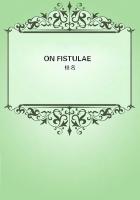This determination, continued Kysarcius, how contrary soever it may seem to run to the stream of vulgar ideas, yet had reason strongly on its side; and has been put out of all manner of dispute from the famous case, known commonly by the name of the Duke of Suffolk's case.--It is cited in Brook, said Triptolemus--And taken notice of by Lord Coke, added Didius.--And you may find it in Swinburn on Testaments, said Kysarcius.
The case, Mr. Shandy, was this:
In the reign of Edward the Sixth, Charles duke of Suffolk having issue a son by one venter, and a daughter by another venter, made his last will, wherein he devised goods to his son, and died; after whose death the son died also--but without will, without wife, and without child--his mother and his sister by the father's side (for she was born of the former venter)then living. The mother took the administration of her son's goods, according to the statute of the 21st of Harry the Eighth, whereby it is enacted, That in case any person die intestate the administration of his goods shall be committed to the next of kin.
The administration being thus (surreptitiously) granted to the mother, the sister by the father's side commenced a suit before the Ecclesiastical Judge, alledging, 1st, That she herself was next of kin; and 2dly, That the mother was not of kin at all to the party deceased; and therefore prayed the court, that the administration granted to the mother might be revoked, and be committed unto her, as next of kin to the deceased, by force of the said statute.
Hereupon, as it was a great cause, and much depending upon its issue--and many causes of great property likely to be decided in times to come, by the precedent to be then made--the most learned, as well in the laws of this realm, as in the civil law, were consulted together, whether the mother was of kin to her son, or no.--Whereunto not only the temporal lawyers--but the church lawyers--the juris-consulti--the jurisprudentes--the civilians--the advocates--the commissaries--the judges of the consistory and prerogative courts of Canterbury and York, with the master of the faculties, were all unanimously of opinion, That the mother was not of (Mater non numeratur inter consanguineos, Bald. in ult. C. de Verb. signific.) kin to her child.--And what said the duchess of Suffolk to it? said my uncle Toby.
The unexpectedness of my uncle Toby's question, confounded Kysarcius more than the ablest advocate--He stopp'd a full minute, looking in my uncle Toby's face without replying--and in that single minute Triptolemus put by him, and took the lead as follows.
'Tis a ground and principle in the law, said Triptolemus, that things do not ascend, but descend in it; and I make no doubt 'tis for this cause, that however true it is, that the child may be of the blood and seed of its parents--that the parents, nevertheless, are not of the blood and seed of it; inasmuch as the parents are not begot by the child, but the child by the parents--For so they write, Liberi sunt de sanguine patris & matris, sed pater & mater non sunt de sanguine liberorum.
--But this, Triptolemus, cried Didius, proves too much--for from this authority cited it would follow, not only what indeed is granted on all sides, that the mother is not of kin to her child--but the father likewise.--It is held, said Triptolemus, the better opinion; because the father, the mother, and the child, though they be three persons, yet are they but (una caro (Vide Brook Abridg. tit. Administr. N .47.)) one flesh;and consequently no degree of kindred--or any method of acquiring one in nature.--There you push the argument again too far, cried Didius--for there is no prohibition in nature, though there is in the Levitical law--but that a man may beget a child upon his grandmother--in which case, supposing the issue a daughter, she would stand in relation both of--But who ever thought, cried Kysarcius, of laying with his grandmother?--The young gentleman, replied Yorick, whom Selden speaks of--who not only thought of it, but justified his intention to his father by the argument drawn from the law of retaliation.--'You laid, Sir, with my mother,' said the lad--'why may not I lay with yours?'--'Tis the Argumentum commune, added Yorick.--'Tis as good, replied Eugenius, taking down his hat, as they deserve.
The company broke up.














